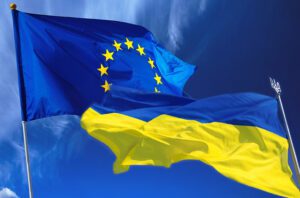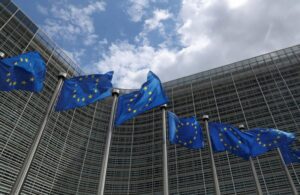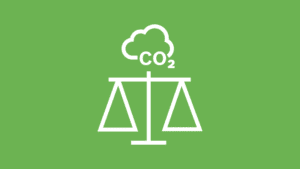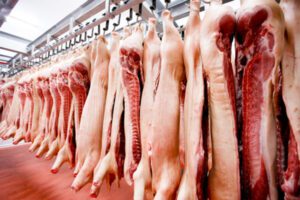
Moldova is applying for membership in the European Union, the country’s President Maia Sandu told a briefing in Chisinau on Thursday evening.
The application to the president of the European Council, French President Emmanuel Macron, will be filed in Brussels in the next few days, she said.
“This is the will our citizens expressed during elections. In the current complex situation we must act quickly and coherently so as to ensure a European, free and democratic future for our citizens,” Sandu said.
She signed the application in front of journalists. It was also signed by parliamentary speaker Igor Grosu and Prime Minister Natalia Gavrilita.

On February 17, 2022, the Verkhovna Rada of Ukraine adopted a law on ratification of the agreement between Ukraine and the European Union on the Common Aviation Area.
Some 311 deputies voted for the ratification of the agreement on Thursday.
The purpose of the agreement is the gradual creation of a Common Aviation Area between Ukraine and the EU and its Member States, based, in particular, on identical rules in the field of flight safety, aviation security, air traffic management, environmental protection, consumer protection, computer reservation systems, as well as on identical rules regarding social aspects.
To this end, the agreement establishes mandatory rules, technical requirements, administrative procedures, basic operational standards and implementation standards applied between the parties.
Common Aviation Area operates on the basis of free access to the air transportation market and on equal terms of competition.
Ukraine is taking the necessary measures to incorporate into the legal system of Ukraine and implement the requirements and standards of the acts of the European Union.
The parties cooperate, among other things, in order to achieve convergence of certification systems in the areas of primary certification and maintaining airworthiness.
Upon request, the Parties shall provide each other with all necessary assistance to prevent acts of illegal seizure of civil aircraft and other illegal acts directed against the safety of such aircraft, their passengers and crew, airports and air navigation facilities, as well as any other threat to the safety of civil aviation.
The Parties recognize the importance of environmental protection in the development and implementation of aviation policy.
As reported, on October 12, 2021, Ukraine and the European Union signed the Common Aviation Area Agreement. On June 28, 2021, the EU Council approved the signing of the Common Aviation Area Agreement with Ukraine, as well as with three other countries – Armenia, Tunisia and Qatar.
The process of harmonization of the Ukrainian aviation space with the EU was started in 1999. On December 12, 2006, the EU Council authorized the European Commission to start relevant negotiations with Ukraine. In October 2013, the text of the Agreement was agreed upon by the parties, but due to foreign policy conditions, its signing was postponed indefinitely.

The ambassadors of the European Union have excluded Ukraine from the list of countries for which it is recommended to lift the restrictive measures imposed on unnecessary travel to the EU due to the COVID-19 pandemic.
This decision was made on Friday in Brussels, diplomatic sources reported to Interfax-Ukraine.
The official decision will be announced next week. It was adopted in connection with the increase in the incidence of coronavirus in Ukraine. The country was included in the list, which is reviewed every two weeks, on 15 July.
As previously reported, on 30 June 2020, the Council adopted a recommendation to gradually remove temporary restrictions on non-essential travel to the EU. This recommendation included an initial list of countries for which Member States can remove travel restrictions at external borders.
On May 20, the Council adopted a recommendation to amend in response to ongoing vaccination campaigns by introducing certain exemptions for vaccinated persons and relaxing the criteria for lifting restrictions for third countries. At the same time, the amendments take into account the possible risks associated with new options, establishing an emergency braking mechanism that allows to quickly respond to the emergence of a new option or deterioration of the situation in a third country.
The Council’s recommendation is not a legally binding document. The authorities of the member countries remain responsible for their implementation.

The European Union has invited the Ukrainian government to determine specific targets for achieving climate neutrality by 2050, 10 years ahead of schedule.
“The EU welcomes the submission of an updated NDC with increased ambition and encouraged Ukraine to continue developing concrete milestones to achieve Ukraine’s climate neutrality by 2050 and to align its sectoral strategies with that objective,” a press release by the EU Delegation to Ukraine, following the second meeting of the working group within the framework of the dialogue on Green Deal between Ukraine and the EU, reads.
The EU reiterated the need for Ukraine to pursue reforms, and strengthen administrative capacities to implement the commitments of enhanced NDC and possibly achieve additional emission reductions.
“The EU underlined the need for rapid adoption, implementation and enforcement of Ukraine’s key environmental legislation (Waste management, Industrial Emissions, Environmental Control, Emerald network) and of the National Forest management Strategy,” the message says.
Deputy Director General NEAR and Head of the Support Group for Ukraine (SGUA) Katarína Mathernová signalled EU’s readiness to support further Ukrainian efforts, including through financial assistance, for setting up a robust Ukrainian climate governance based on long-term climate neutrality objectives which would guide policies and the “whole-of-the-economy” green transition.
As reported, in accordance with NDC, Ukraine should reduce greenhouse gas emissions by 65% of the 1990 level by 2030, and achieve climate neutrality by 2060. Such goals were set and approved by the Cabinet of Ministers decree of July 30, 2021.

Ukrainian importers in January-August fully used quotas for duty-free import of pork from the European Union, further import of chilled pork will be subject to a 12% duty, and frozen pork – 10%, this was reported on the website of the Pig Breeders of Ukraine association. “As of September 1, some 20,000 tonnes of chilled and frozen pork from the EU countries were brought to Ukraine. This corresponds to the quota for duty-free supply of pork from the European Union countries established under the economic part of the Association Agreement. Since these limits have been used this year, each next kilogram of European chilled pork will cost importers 12% more due to the duty, and frozen pork meat will rise in price by 10%,” the organization said.
According to the association, there has been some recovery in import activity this year, which confirms the use of the pork import quota in August, while in previous years the import quota was used in November-December.
It clarified that Ukrainian importers have similar agreements on duty-free supplies of up to 14,400 tonnes of pork from Canada (the quota was used by 9%) and up to 1,700 tonnes from the UK (no deliveries from this country were made in 2021).
“If the import of raw meat from these countries becomes economically attractive for the importer, the supply of frozen pork is unlikely to have a significant impact on the domestic pork market. In addition, the expected changes in exchange rates in the fall will also increase the entry barrier for imported raw materials,” the association concluded.

The European Union has officially published its list of sectoral sanctions against Belarus.
In line with the decision of the EU Council, which was published in the EU’s official journal, the ban on import or transit from Belarus of highly significant export goods for the country, petroleum products and potash fertilizers, applies to contracts signed after June 25, 2021. The EU sanctions thus do not apply to current contracts for supplies of petroleum products and potash fertilizers.
“It shall be prohibited […] to transport petroleum products if they originate in Belarus, or are being exported from Belarus to any other country; to provide, directly or indirectly, technical assistance, brokering services, financing or financial assistance, including financial derivatives, as well as insurance and re-insurance […]. The prohibitions […] shall be without prejudice to the execution of contracts concluded before June 25, 2021, or ancillary contracts necessary for the execution of such contracts,” the document said.
Similar sanctions are envisaged for potash fertilizers from Belarus. “It shall be prohibited to import, purchase or transfer, directly or indirectly, potassium chloride (‘potash’) products […] from Belarus, whether or not originating in Belarus. The prohibitions […] shall be without prejudice to the execution of contracts concluded before June 25, 2021, or ancillary contracts necessary for the execution of such contracts,” it said.
BANS, BELARUS, EUROPEAN UNION, IMPORT, OIL PRODUCTS, TRANSIT